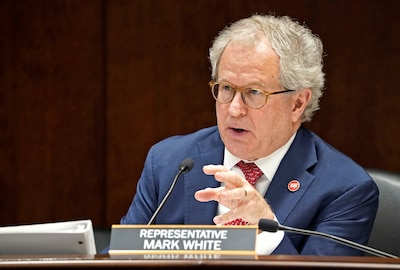With the cost of quality child care often exceeding in-state tuition bills at Tennessee colleges, two lawmakers filed legislation Monday to create a state government program to offer child care scholarships to low- and middle-income families.
Dubbed Promising Futures, the program would use tax revenue from the state’s growing sports betting industry, most of which currently goes into a lottery education fund that supports the popular HOPE and Tennessee Promise college scholarships.
The bill comes after a 2022 study found that Tennessee businesses and taxpayers are losing $2.6 billion annually in earnings and revenue because parents have problems accessing child care.
Those numbers amount to a crisis, say state Sen. Becky Massey and Rep. Mark White, who are sponsoring the legislation.
“Working parents of young children struggle with child care affordability, quality, and access, which affect their ability to work,” said Massey, a Knoxville Republican. “In turn, many businesses are struggling to find employees.”
White believes that Promising Futures can do for early child care access what Tennessee Promise has done for higher education access. Under that groundbreaking initiative created in 2014 under former Gov. Bill Haslam’s administration, Tennessee became the first state to offer its high school graduates a chance at two years of tuition-free community or technical college.

“Promising Futures is just as important,” said White, a Memphis Republican who chairs a House education committee. “We can help our young families, support early childhood growth, and position our state on the front end to improve our literacy rate.”
Their bill would launch the program in mid-2024, for children through age 5 whose parents’ household income does not exceed the state’s median income (currently $67,708 for a two-person household, $79,719 for a family of three, and $88,095 for a family of four). Also eligible would be children who reside with a foster parent or legal guardian. The state education department would oversee the scholarships and pay funds directly to the program in which a child is enrolled.
The program would capitalize on rapid growth in tax revenue from the sports betting industry.
Tennessee legalized sports wagering in 2019 and collects 20% of the gaming industry’s adjusted gross revenues as a privilege tax. Of that, 80% currently goes to the lottery fund deployed primarily for higher education scholarships, 15% to the state to distribute to local governments, and 5% toward mental health programs.
The Promising Futures bill proposes starting the scholarship program in mid-2024 with 60% of the privilege tax revenue from sports wagering, increasing to 80% by mid-2025. Such a change might also require changes to how the remaining 20% gets allocated.
Other lawmakers have been eyeing that growing pot of money, too. Last year, Rep. David Hawk, of Greeneville, sponsored a bill that would have directed some sports betting tax revenues to local governments to help them deal with the skyrocking cost of school construction. But his measure stalled in committee.
Massey thinks now is a good time to redirect sports betting money toward child care and early education needs.
“The lottery fund has a good reserve, so it’s not going to jeopardize the money needed to (keep) Tennessee Promise a viable program,” she said.
At a legislative hearing earlier this month, Mary Beth Thomas, the executive director of Tennessee’s Sports Wagering Advisory Council, reported the state collected more than $68 million in sports betting privilege taxes in 2022, compared with $40.6 million a year earlier.
Promising Futures is backed by Tennesseans for Quality Early Education, or TQEE, which formed in 2016 to advocate for a strong education foundation from birth to third grade. The group, which has more than 30,000 members across Tennessee, launched a website and petition Monday seeking public support for the bill.
“Child care is crucial to early health and brain development. It’s really in all of our best interests to ensure those child care settings are high quality,” president and CEO Blair Taylor told Chalkbeat.
“With Promising Futures, we’ll not only be helping the workforce of today; we’ll be preparing the workforce of tomorrow,” she said.
TQEE conducted last year’s child care study with support from Zogby Analytics and economist Cleve Belfield. The survey of nearly 1,300 working parents with children under 6 found 80% reported employment disruptions due to inadequate child care. Of those, 26% quit or were fired, 32% turned down a job offer or promotion, and 30% reduced their work hours from full time to part time or were prevented from increasing their hours to full time. About 20% stopped seeking employment altogether.
You can track the bill’s progress on the state legislature’s website.
Marta Aldrich is a senior correspondent and covers the statehouse for Chalkbeat Tennessee. Contact her at maldrich@chalkbeat.org.






